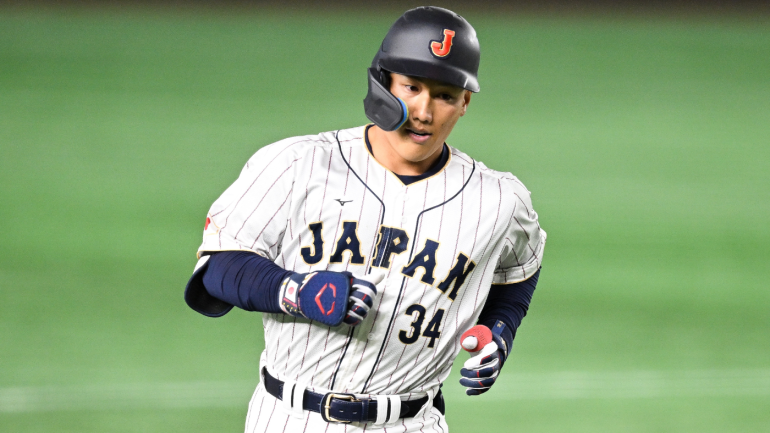
Japan, unquestionably the most successful team in World Baseball Classic history, could add to its legacy on Monday night. A win against Mexico would send them to the finals, where they may become the first nation to hoist three WBC crowns. Japan is already the only team to have finished in the top three in the first four tournaments, with title wins in both 2006 and 2009. Japan also won the gold medal in baseball as part of the 2020 Tokyo Olympics, cementing a status as the most dominant country in international baseball competition.
It should not have qualified as a surprise, then, that Team Japan was considered by CBS Sports to be the favorite entering the tournament. They've since reinforced that notion by outscoring their foes 47-11 in five games. Japan has won each contest by at least six runs, including a 9-3 quarterfinal rout against Italy, and has not yet been held to fewer than seven runs.
What, precisely, is behind Japan's excellence at the WBC? Let's highlight a few factors, including three of the most exciting young players in the world.
1. Veteran buy-in
Whereas in the United States there's been an ongoing debate as to where the WBC should rank in relation to Major League Baseball obligations, no such argument exists in Japan. Hence Padres ace Yu Darvish suiting up when he has nothing more to prove in international competition, or Angels two-way phenom Shohei Ohtani partaking even though he's entering his walk year.
102 MPH FROM SHOHEI OHTANI 🔥🇯🇵
— FOX Sports: MLB (@MLBONFOX) March 16, 2023
📺: WBC on FS2 pic.twitter.com/aRa2kaNDZ4
That's without mentioning a pair of outfielders who could've skipped the tournament without catching flack. Masataka Yoshida, now with the Red Sox, would've been within reason to forgo the WBC in order to further acclimate to his new surroundings. Lars Nootbaar of the Cardinals, on the other hand, could have prioritized his self-interests by sticking in camp and proving to his organization that last season's breakout effort was the real deal.
There are a few notable players missing from Team Japan's roster. Cubs outfielder Seiya Suzuki had to withdraw after suffering an injury. Mets right-hander Kodai Senga, meanwhile, wanted to continue to get used to his American settings, including MLB's different ball. Fair enough.
There's nothing wrong with putting one's career first. These are adults and they should have agency over their livelihoods. We're noting, with no intent to glorify, that Japan's veterans clearly value the tournament more than some of their MLB teammates do -- and that Japan's team benefits as a result.
2. Outstanding young talent
Entering the tournament, CBS Sports highlighted four international players who could make their way to MLB over the coming years. Three of those individuals suit up for Team Japan: starters Yoshinobu Yamamoto and Roki Sasaki and third baseman Munetaka Murakami. All three are 24 years old or younger, and all have already established themselves as incredible talents.
Get to know the 21-year-old phenom Roki Sasaki.
— World Baseball Classic (@WBCBaseball) March 11, 2023
His stuff is filthy! pic.twitter.com/NYcWiYFZFi
While Murakami hasn't had the best WBC -- his .770 OPS ranks 13th on Japan's roster -- both Yamamoto and Sasaski made an impression during pool play. In two starts, they combined to throw 7 2/3 innings, surrendering an unearned run on three hits and two walks. They fanned 16 batters, meaning that roughly 70 percent of their outs were of the strikeout variety. (Keep in mind that the WBC has strict restrictions on how much and how often pitchers can throw.)
MLB teams are already salivating about the possibility of adding either Yamamoto or Sasaki to their rotation in the coming years. The WBC has done nothing but intensify that desire.
3. Strong supporting cast
This is an American-based publication writing for a largely American audience. It's natural, on some level, to approach these things through a MLB prism. Hence the above focus on players who are either in MLB or could be soon. (Besides, MLB is the biggest league in the world, in large part because it employs and attracts the top talent from all over the globe, including Japan.)
Even so, there's no excuse for sleeping on the quality of Japan's baseball scene. Nippon Professional Baseball is the second-best league in the world, with a rich and compelling history of its own. Japan is clearly doing something right on a player development level, too, given how well their record in international competitions and their nurturing of many of the world's top talents.
As such, it's important to highlight the contributions Japan has received from individuals who may never suit up for a MLB team. That includes Kensuke Kondoh, a 29-year-old undersized outfielder with the second-highest OPS on the team, and first baseman Kazuma Okamoto, whose six runs batted in trail only Yoshida and Ohtani for the team lead. It also includes players who are on the MLB bubble, like reliever Shota Imanaga and young lefty Hiroya Miyagi, a former No. 1 pick who showed off a varied arsenal (albeit not complete with the kind of power stuff possessed by Sasaki or his Orix teammate Yamamoto), and a skillful pickoff move as part of Japan's dismantling of the Czech Republic.
Hiroya Miyagi with the pick off at second base to end the top half of the 5th
— FOX Sports: MLB (@MLBONFOX) March 11, 2023
📺: FS1 and the FOX Sports App pic.twitter.com/wKOF40bcCR
Patch it together, and Japan's success is easier to understand. For they have all-world talent and, perhaps just as importantly, the desire to prove it time and again on the global stage.






















